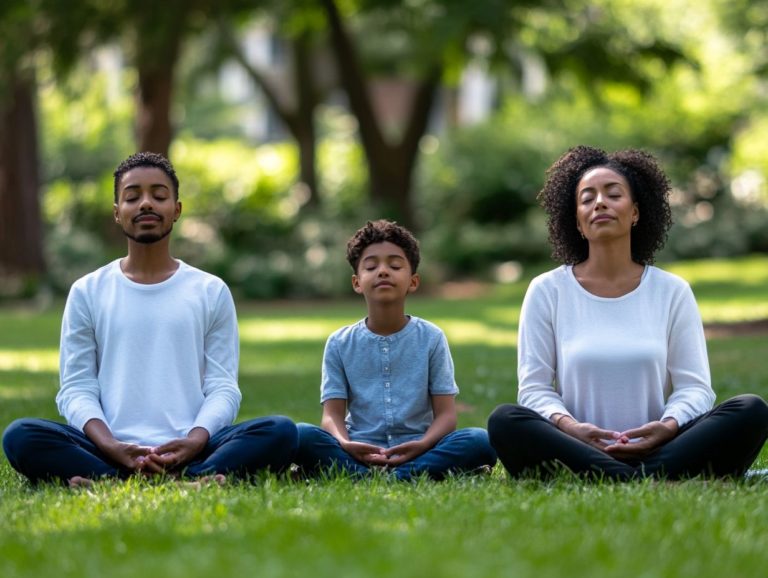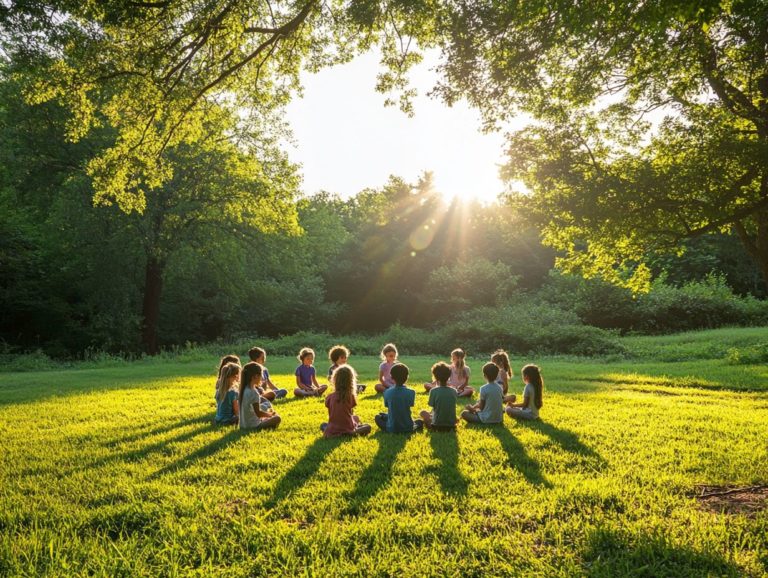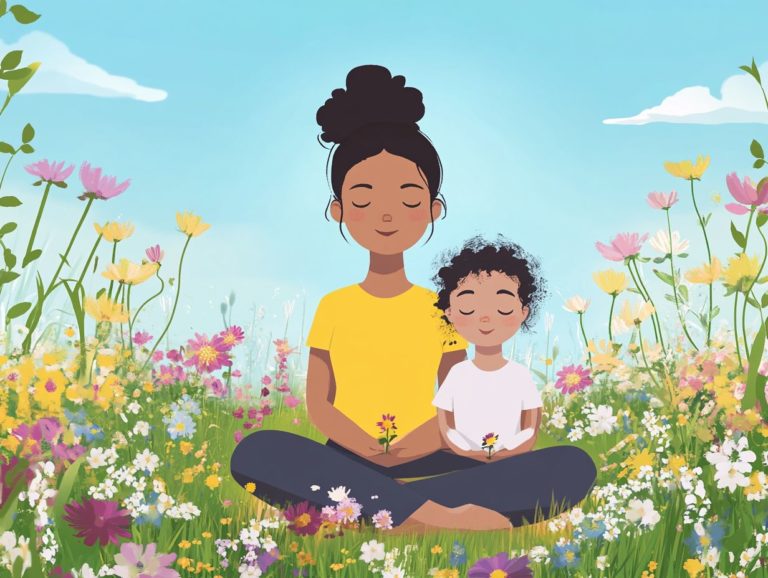How to Use Mindful Reflection in Parenting
In today’s fast-paced world, you might find mindful parenting to be an overwhelming endeavor, often leaving scant opportunity for self-reflection. However, get ready to transform your parenting journey!
Embracing mindful reflection serves as a powerful tool for you as a parent. It allows you to pause, assess your feelings, and evaluate your approaches to raising your children and improving your parent-child relationship.
This article delves into the essence of mindful reflection, highlighting its importance for both you and your children. It offers practical strategies for weaving it into your daily life through mindful parenting techniques.
By adopting this practice, you can cultivate healthier relationships and create a nurturing environment for your children to thrive, supporting their mental health and emotional development.
Contents
- Key Takeaways:
- What is Mindful Reflection?
- Why is Mindful Reflection Important in Parenting?
- How to Incorporate Mindful Reflection in Parenting?
- Techniques for Mindful Parenting
- 5. Reflect on Your Child’s Behavior
- How to Use Mindful Reflection for Conflict Resolution in Parenting?
- 1. Identify the Conflict
- 2. Reflect on Your Own Emotions and Responses
- Using Mindful Reflection in Parenting
- Frequently Asked Questions
- What is mindful reflection and how can it help with parenting?
- Why is it important to use mindful reflection in parenting?
- How can I incorporate mindful reflection into my parenting routine?
- Can mindful reflection help me be a more patient and understanding parent?
- How can mindful reflection improve my communication with my children?
- Are there any resources or tools to help me practice mindful reflection in parenting?
Key Takeaways:

- Mindful reflection is a practice that involves being present, aware, and non-judgmental of our thoughts and emotions.
- In parenting, mindful reflection can help improve communication, reduce stress, and increase empathy for both parents and children.
- Incorporating mindful reflection in parenting involves setting aside time for reflection, practicing mindful breathing, and reflecting on parenting styles and your child’s behavior.
What is Mindful Reflection?
Mindful reflection is an intentional practice that invites you to engage in self-reflection and mindfulness techniques. This enhances not only your parenting style but also the overall family dynamics and cooperative parenting.
By cultivating mindful awareness, you can develop emotional intelligence. This is crucial for fostering a secure attachment with your children and promoting emotional regulation during various parenting challenges.
Your journey requires thoughtful consideration of your actions, motivations, and feelings as you navigate the complexities of raising children. This allows you to address behavioral issues while nurturing supportive relationships.
Experts like Rachael Green and Yolanda Renteria from the Center for Reflective Parenting illustrate how mindful reflection lays the groundwork for positive parenting and effective communication, as highlighted in Verywell Mind.
Why is Mindful Reflection Important in Parenting?
Mindful reflection is vital for your parenting journey. It helps you gain deeper insights into your strategies and emotional intelligence, enriching your relationship with your child.
By engaging in reflective thinking and tuning into your emotional needs, you can enhance your listening skills, cultivate compassion, and navigate parenting challenges with greater ease.
This approach promotes emotional regulation within you and provides the mental health support your child needs for healthy development.
Ultimately, embracing mindful reflection empowers you with constructive solutions and nurturing behaviors that lay the foundation for secure attachment and positive family dynamics.
How Can Mindful Reflection Benefit Parents?
Mindful reflection can significantly enhance your parenting journey. It equips you with the tools to manage stress and improve your emotional regulation skills.
Taking time for self-reflection allows you to gain valuable insights into your emotional needs, recognize behavioral patterns, and develop a compassionate approach to discipline strategies.
This practice encourages you to acknowledge your feelings and responses. Ultimately, this leads to better communication skills and the ability to apply positive reinforcement in your parenting. The result? A more resilient and nurturing family environment and improved kids’ mental health!
Engaging in mindful reflection also helps you combat feelings of overwhelm and anxiety. It empowers you to step back and evaluate situations with clarity.
This nurtures your mental well-being and sets a positive example for your children, teaching them about emotional intelligence and self-management from a young age, supporting their early childhood development.
Mindful reflection enhances your conflict resolution skills. This allows you to address misunderstandings with patience and empathy.
Over time, these benefits forge stronger family bonds, making it easier for you to navigate the complexities of raising children in today s fast-paced world through mindful interactions.
Benefits of Mindful Reflection for Children
Mindful reflection can significantly impact your child’s development by fostering understanding of feelings and empathy from an early age. Engaging in mindful practices creates a nurturing environment that encourages your child to articulate their feelings and understand their emotional needs.
This approach establishes a secure attachment and enhances their social skills, empowering them to navigate childhood with confidence and compassion.
By promoting regular mindful reflection, you help your child learn to calm their mind and focus on their internal experiences. This practice enables them to recognize their own emotions and those of others, laying the groundwork for stronger relationships with their peers.
Research shows that children who practice mindfulness often exhibit improved attention spans and are better equipped to handle stress, leading to enhanced school performance and reduced anxiety as part of their overall child development.
Mindful reflection can instill a sense of gratitude and perspective in your child, allowing them to approach challenges with resilience and optimism. Ultimately, this contributes to their overall emotional intelligence and social competence, equipping them for a successful future with strong conflict resolution skills and empathy development.
How to Incorporate Mindful Reflection in Parenting?
Incorporating mindful reflection into your parenting journey involves a series of intentional practices designed to elevate your parenting behaviors and foster emotional support within your family, including parenting workshops for continuous learning.
By embracing mindful techniques, you create a supportive environment that encourages self-reflection and emotional regulation, enabling you to gain deeper insights into your parenting style and develop constructive solutions.
These practices not only help you articulate your feelings and approaches, but they also empower you to respond empathetically to your children’s emotional needs, ultimately strengthening your bond with them and enhancing your family dynamics.
Effectively integrating mindful reflection can lead to improved discipline strategies, enhanced communication skills, and a more harmonious family dynamic, fostering supportive relationships.
1. Set Aside Time for Reflection
Take a moment each day for reflection; it s a powerful step toward mindful parenting. Setting aside dedicated time for reflection enables you to engage in self-assessment and evaluate your parenting responsibilities. By prioritizing this time, you can take a closer look at your emotional responses, consider your parenting strategies, and pinpoint areas for personal growth.
This practice not only cultivates mindfulness but also enhances your relationship with your child by fostering open communication and emotional support through reflective parenting.
To effectively carve out this essential time, establish a consistent routine perhaps dedicating a few minutes each evening or a longer session on weekends for quiet contemplation. Creating a calming environment free from distractions can further facilitate deeper reflection. Journaling can prove to be a valuable tool; it encourages you to document your thoughts and feelings, making it easier to identify behavioral patterns and areas for improvement.
Over time, as you continuously engage in this practice, you will likely notice a stronger bond with your child, as you become more attuned to their emotional needs and increasingly capable of responding thoughtfully.
By practicing mindful reflection, you are not just improving your parenting skills; you are also nurturing your child’s emotional growth and resilience, paving the way for their future success!
Techniques for Mindful Parenting
2. Practice Mindful Breathing
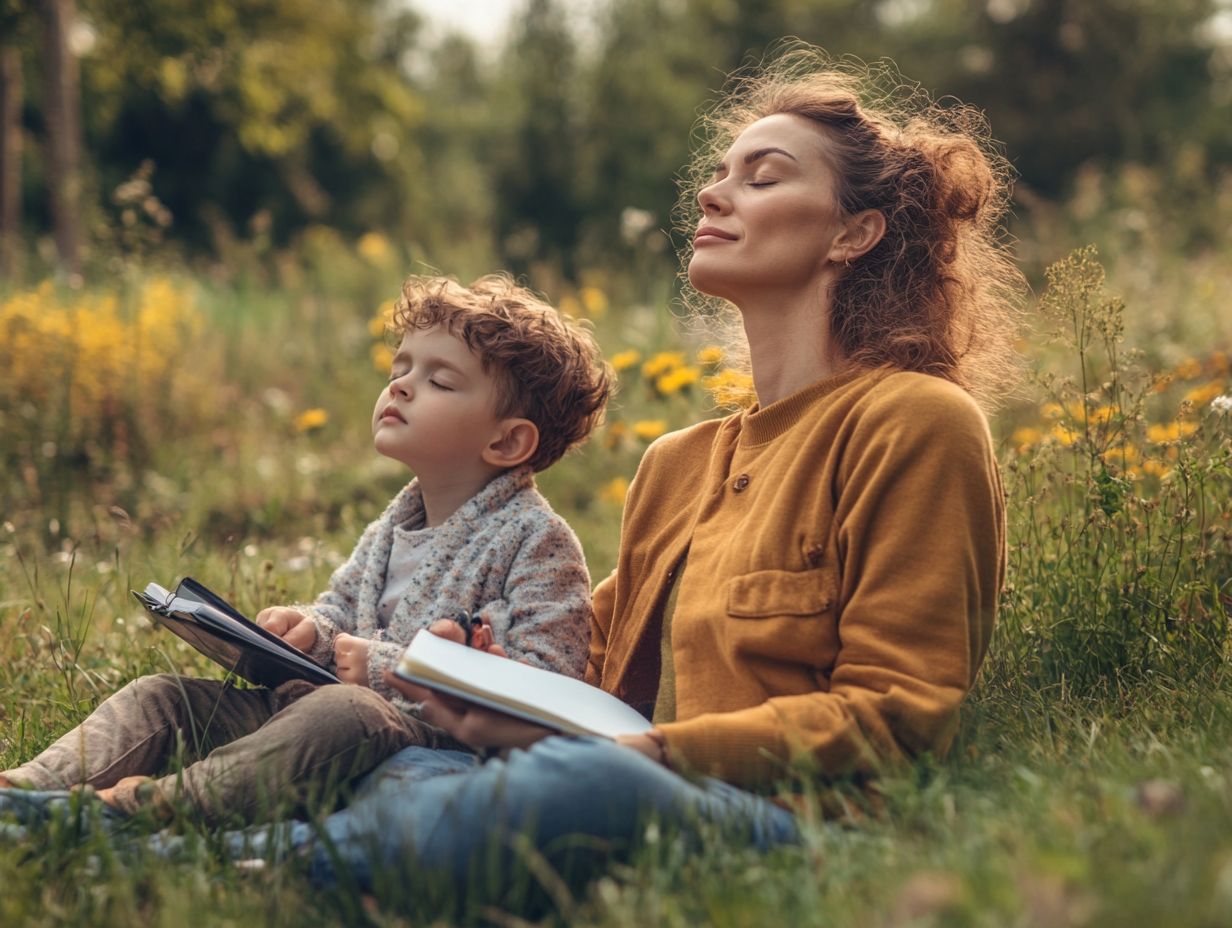
Practicing mindful breathing is a transformative technique that empowers you to manage parenting stress and develop mindfulness. By focusing on your breath, you can pause, reflect, and respond thoughtfully to your child’s needs. This practice calms heightened emotions and nurtures a compassionate approach to parenting, fostering a more supportive family dynamic.
Incorporating mindful breathing into your daily routine can be as simple as reserving a few moments each morning or taking a breather during particularly challenging times throughout the day. For example, when you feel overwhelmed, you can close your eyes for a minute, inhale deeply, and exhale slowly, creating a pocket of calm. These brief moments can significantly lower your anxiety levels, making it easier to navigate the demands of parenting and improve your mental health support.
Teaching your children about mindful breathing can establish a shared practice within your family, promoting emotional intelligence and resilience for both you and your kids. Start your mindful breathing practice today to transform your parenting journey!
3. Reflect on Your Parenting Style
Reflecting on your parenting style is an essential practice that empowers you to evaluate your strategies and emotional intelligence. By engaging in self-reflection, you can identify your strengths and pinpoint areas for improvement, enabling you to adapt your approach to better meet your children’s emotional needs. This practice fosters a deeper understanding of family dynamics and promotes cooperative parenting, ultimately enhancing the bond between you and your child through mindful parenting practices.
It encourages you to consider the long-term effects your parenting choices may have on your children’s development and self-esteem. Techniques like journaling can provide you with valuable insights and facilitate constructive conversations within your family.
The act of reflecting not only gives you the power to make informed decisions but also nurtures an environment where your children feel valued and understood. By prioritizing this introspective approach, you can cultivate healthier interactions, reduce conflict, and create a stronger sense of unity, ensuring that each family member thrives both emotionally and socially.
4. Identify Triggers and Responses
Identifying your triggers and responses is a crucial aspect of mindful reflection that gives you the power to navigate parenting challenges with grace. By recognizing situations that provoke strong emotional reactions, you can cultivate better emotional regulation and conflict resolution strategies.
This process requires you to tune in to the internal cues that signal distress, such as feelings of frustration or anxiety, which often surface during tense moments. With this heightened awareness, you can learn to pause and evaluate your immediate emotional responses instead of reacting impulsively.
By employing techniques like journaling or mindfulness meditation, you can uncover insights into your behavioral patterns and the underlying causes of your emotions. As you refine these skills, you ll become more adept at fostering calm and constructive dialogues with your children, ultimately paving the way for more harmonious family dynamics.
This proactive approach enhances not only your emotional resilience but also cultivates an environment that encourages open communication and mutual respect.
5. Reflect on Your Child’s Behavior
Reflecting on your child’s behavior is essential for gaining a deeper understanding of their emotional needs. This practice enhances your parenting insights.
By observing and contemplating their actions, you can uncover valuable information about their development and emotional awareness. It also sheds light on their social decision-making abilities.
This reflective practice fosters the development of empathy and nurtures positive parenting behaviors. This, in turn, creates a supportive environment for your child’s growth.
Through careful observation, you can identify patterns in your child’s responses to various situations. This provides deeper insights into their underlying emotions.
Engaging in discussions about their feelings and reactions encourages your child to articulate their experiences. This promotes understanding feelings.
Understanding the context of your child’s behavior gives you the power to respond thoughtfully rather than react impulsively. This strengthens your bond.
This practice also aids in identifying early signs of emotional distress or behavioral challenges. Timely intervention is crucial.
Ultimately, investing time in reflection sharpens your parenting skills. It supports your child’s mental and emotional well-being, leading to healthier, happier family dynamics.
How to Use Mindful Reflection for Conflict Resolution in Parenting?
Utilizing mindful reflection for conflict resolution can profoundly elevate your communication skills. It also enhances emotional regulation when faced with challenging situations.
By embracing mindful practices, you can approach conflicts with a sense of calm. This paves the way for reflective thinking that yields constructive solutions.
This approach builds a cooperative parenting style that emphasizes kind communication. Ultimately, it fortifies your relationship with your child and fosters emotional support during disagreements.
1. Identify the Conflict
Identifying the conflict is your first step toward resolution. This allows you to engage in mindful reflection and assess the situation with emotional awareness.
By recognizing the root of the conflict, you gain a deeper understanding of your emotions and responses. This enables you to approach the issue with a clearer perspective.
This clarity becomes a valuable tool for navigating parenting challenges. It fosters a more supportive environment for resolution.
Through this understanding, you model healthy conflict resolution for your children. You cultivate a home atmosphere where open communication thrives.
Acknowledging conflicts paves the way for valuable discussions. These illuminate diverse perspectives and encourage collaborative problem-solving.
This reflective practice minimizes misunderstandings and reduces stress. Ultimately, it enhances your relationship with your child.
By actively engaging in this process, you can transform potential disagreements into opportunities for growth. This reinforces the bond between you and your children as you work toward solutions together.
2. Reflect on Your Own Emotions and Responses
Reflecting on your own emotions and responses during conflicts is crucial for achieving effective conflict resolution. This is essential for emotional regulation in mindful parenting.
By dedicating time to examine how your personal feelings influence your reactions, you cultivate a deeper self-awareness. This leads to more thoughtful and compassionate parenting behaviors.
This practice allows you to model emotional intelligence for your children. It helps you navigate conflicts with greater empathy.
When you consciously evaluate your emotional triggers and habitual responses, you gain valuable insights. These insights give you the power to respond more constructively.
This reflective approach diminishes impulsive reactions and opens the door to healthier communication patterns. By understanding the root causes of your emotions, you foster resilience and patience.
These qualities are essential during challenging interactions.
This self-examination encourages you to adopt a collaborative mindset when resolving disputes. This creates a harmonious environment.
In such an environment, your children can also learn the importance of emotional regulation. Ultimately, such intentional reflection enriches your familial relationships.
It supports lifelong emotional development for both you and your children.
3. Encourage Your Child to Reflect
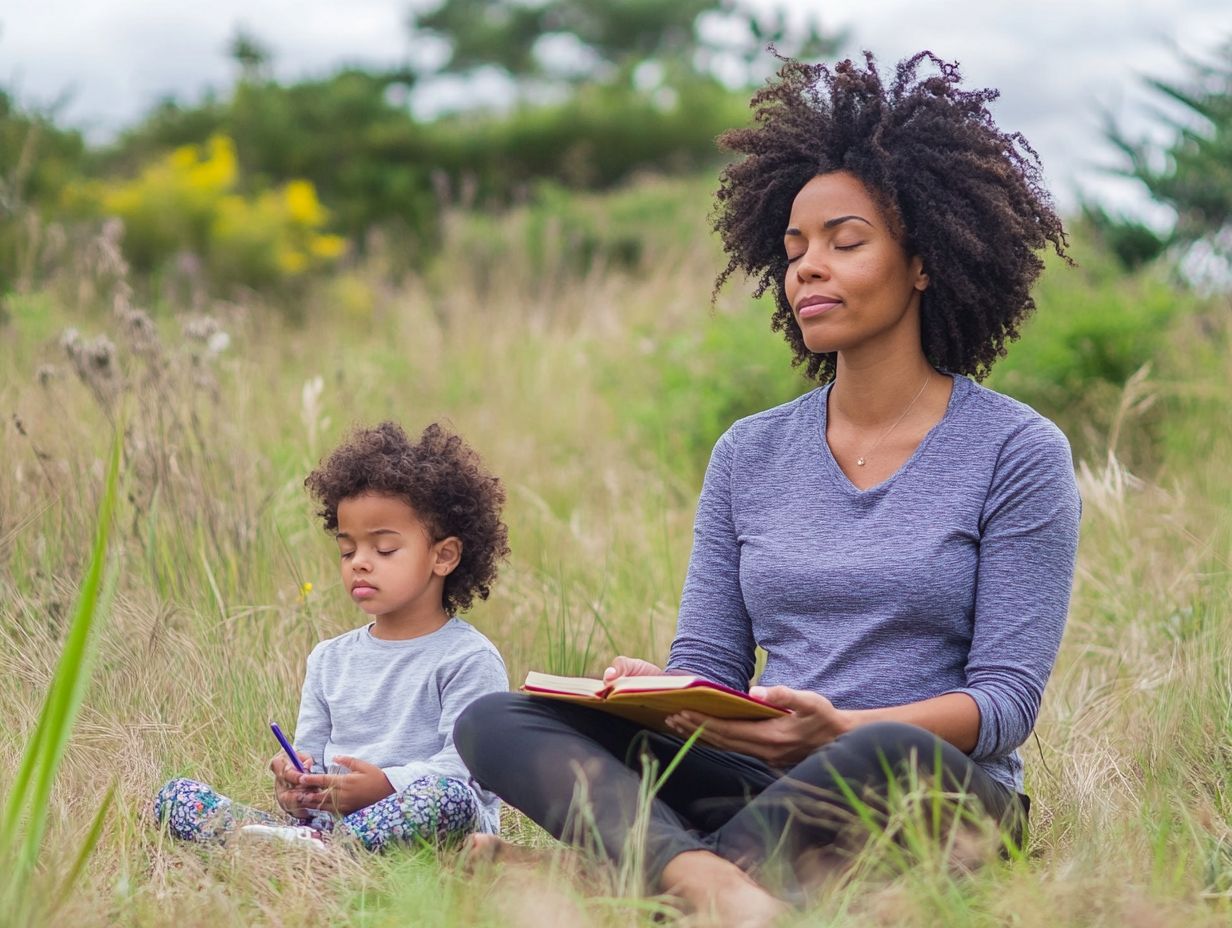
Encouraging your child to reflect on their emotions and behaviors is essential for fostering emotional awareness and effective conflict resolution. By guiding them through self-reflection, you empower your child to articulate their feelings and understand their responses. This paves the way for personal growth and resilience.
This practice also emphasizes the importance of communication skills and nurtures supportive relationships within your family. Creating an environment where discussions about feelings are the norm can significantly enhance your child s ability to process their emotions.
Consider establishing regular family meetings or check-ins, providing each member with the opportunity to share their thoughts and feelings in a safe space. This approach helps your child learn to express themselves and equips them with invaluable conflict resolution skills.
As a result, they will be able to navigate relationships more effectively throughout their lives. The benefits of these reflective practices can lead to stronger family bonds and a deeper understanding of oneself, ultimately preparing your child for the complexities of the world around them.
4. Find a Solution Together
Finding a solution together as a family is a crucial step in resolving conflicts. It reinforces your commitment to cooperative parenting and collaborative problem-solving. By engaging in open discussions and reflective thinking, both you and your children can generate constructive solutions that tackle the core issues of the conflict.
This collaborative approach strengthens your relationship with your children and fosters a sense of shared responsibility and emotional support within the family. When every family member participates in the conflict resolution process, they learn to appreciate diverse perspectives.
This enhances empathy and understanding among one another. As you brainstorm solutions together, your children will develop critical thinking skills and learn to articulate their feelings. You reinforce the idea that every voice matters.
This method can significantly reduce feelings of resentment and frustration that often arise from unresolved disagreements. Ultimately, collaboratively finding solutions leads to improved resolutions and nurtures a more harmonious family environment.
This establishes a healthy foundation for emotional security and connection.
How to Teach Mindful Reflection to Children?
Teaching mindful reflection to children is crucial for nurturing their emotional awareness, fostering empathy, and promoting positive parenting. By introducing reflective practices at an early age, you can provide them with essential tools for managing their own emotions and behaviors and making better choices.
This solid foundation creates a supportive environment where children feel safe to express their emotions and engage in meaningful interactions. Ultimately, this enriches their overall development.
1. Lead by Example
Leading by example is a remarkably effective way to cultivate mindful reflection in children. They tend to mirror their parents’ behaviors and attitudes. By demonstrating emotional intelligence and reflective thinking, you can nurture your child’s understanding of mindfulness and emotional regulation.
This approach reinforces positive parenting behaviors and creates an environment where children feel encouraged to express their emotions. They can reflect on their experiences, benefiting their emotional awareness and children’s mental health.
When you actively model mindful reflection, you establish a safe space for your child to explore their feelings and thoughts without fear of judgment. Sharing your own experiences both successes and challenges allows them to recognize that reflecting on emotions is a valuable skill.
This skill is an integral part of conflict resolution and compassion. By incorporating mindfulness practices into daily routines, such as taking a moment to breathe or expressing gratitude, you teach your child the importance of self-awareness and emotional health.
This essential lesson gives them the tools to navigate complex situations, develop resilience, and forge strong, healthy relationships as they grow. This enhances their self-reflection and personal growth.
Using Mindful Reflection in Parenting
Mindful reflection is a powerful tool for nurturing emotional intelligence in children. This article discusses several strategies for incorporating guided reflection, open communication, and practices of gratitude and empathy into your family’s routine. Here are some effective methods to enhance emotional awareness and strengthen family bonds.
2. Use Guided Reflection Exercises
Engaging in guided reflection exercises is a powerful approach to teaching mindfulness to children. These exercises enhance their emotional awareness and foster self-reflection. By posing simple questions about their feelings, experiences, and reactions, you create a safe space for them to articulate their thoughts.
This practice supports their emotional development and provides invaluable assistance for you as a parent. It encourages meaningful discussions and nurtures positive behaviors within the family.
Incorporating activities like journaling or storytelling allows you to cultivate a nurturing environment that deepens connections among all family members. For example, inviting your children to reflect on their day can help them pinpoint specific emotions linked to various experiences, enriching their emotional vocabulary and strengthening the parent-child relationship.
These guided reflections can introduce themes of empathy and gratitude. They enable your children to appreciate their feelings while becoming aware of others’ perspectives. Such exercises not only enhance family interactions but also equip your children with vital life skills essential for their emotional maturity and resilience. They also improve conflict navigation and social decision-making abilities.
3. Encourage Open Communication
Encouraging open communication is essential for guiding children toward mindful reflection. It creates a secure environment where they can express their emotions and needs freely. By fostering a culture of dialogue, you help children articulate their thoughts and feelings, enhancing their emotional awareness and reflective thinking skills.
This practice nurtures empathy and fortifies the parent-child relationship through honest and thoughtful interactions. Engaging in sincere discussions enables children to navigate their emotions more effectively, paving the way for healthier emotional development.
As children learn to express their feelings and experiences, they become increasingly adept at understanding the perspectives of others. This skill greatly improves their communication abilities and empathy development.
Understanding emotions is vital for emotional intelligence, which significantly influences their ability to connect and interact meaningfully with peers and caregivers. By prioritizing open communication, you empower children to reflect mindfully on their experiences, ultimately fostering resilience, positive reinforcement, and a strong sense of community.
4. Practice Gratitude and Empathy
Practicing gratitude and empathy is essential for nurturing mindful reflection. This practice enhances emotional awareness and fosters a positive outlook on life. By encouraging children to express gratitude for their experiences and empathize with others, you instill valuable reflective thinking skills that elevate their emotional intelligence and compassion.
Supporting their social decision-making abilities creates a nurturing family environment where emotional needs are prioritized, promoting secure attachments and improving family dynamics.
Consider introducing simple activities, like sharing daily highlights at dinner or writing thank-you notes, to reinforce these concepts while making them enjoyable. Discussing feelings in response to different situations helps children recognize and express emotions in themselves and others, aiding in their ability to manage their feelings and develop reflective parenting skills.
By modeling empathetic behavior and expressing appreciation within the family, you create a ripple effect that shapes your children’s understanding of empathy and gratitude as vital components of healthy relationships. Ultimately, fostering these skills enriches family bonds and prepares children to navigate the complexities of the wider world with kindness and understanding. This enhances their ability to find constructive solutions to behavioral issues and other parenting challenges.
Frequently Asked Questions
Below are some frequently asked questions regarding mindful reflection in parenting. These questions can help parents better understand the techniques and their benefits.
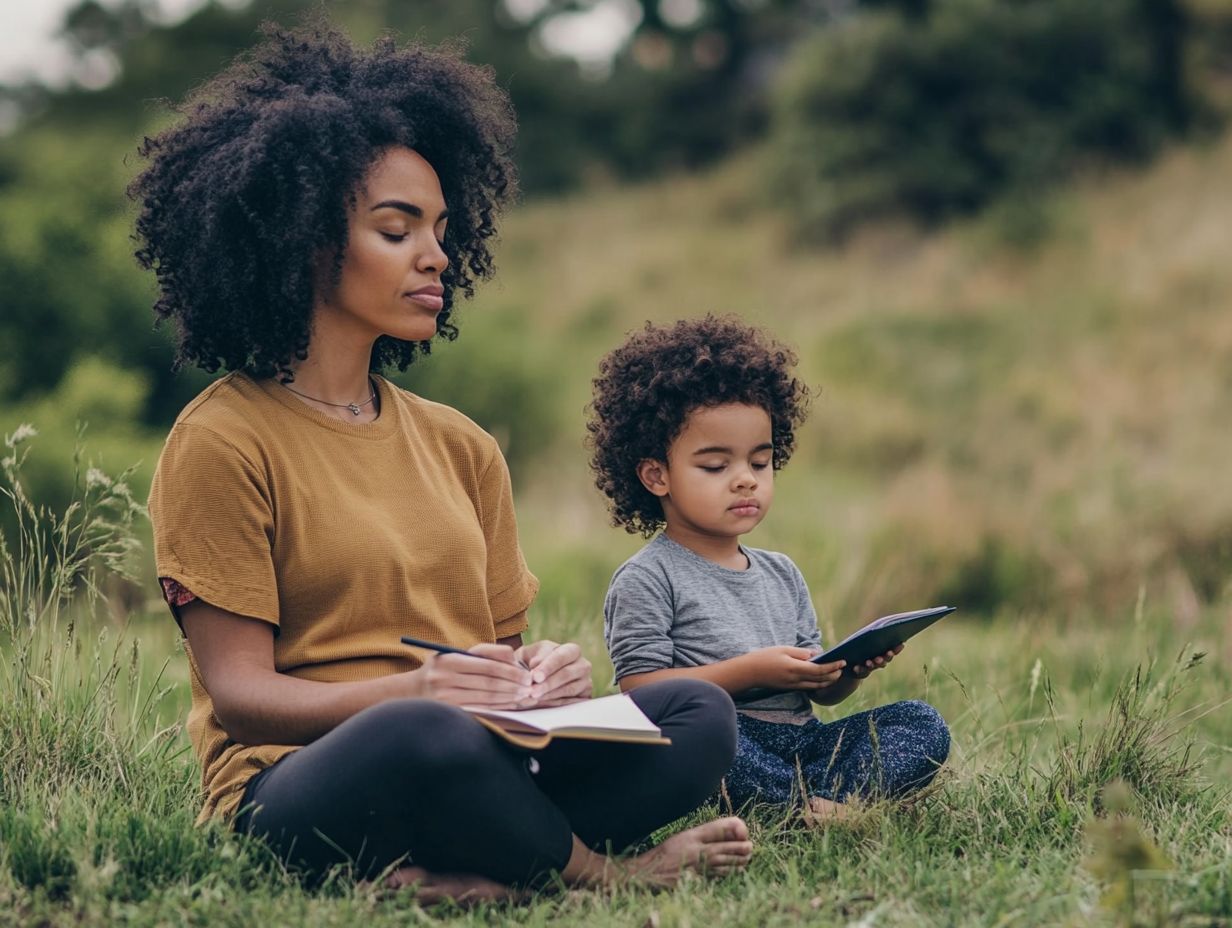
What is mindful reflection and how can it help with parenting?
Mindful reflection is the practice of intentionally paying attention to our thoughts and emotions in a non-judgmental way. This practice helps parents become more aware of their reactions and behaviors.
By doing so, they can respond to their children with greater understanding and compassion. It also helps improve parenting styles and manage parenting stress better.
Why is it important to use mindful reflection in parenting?
Mindful reflection can help parents become more self-aware and regulate their emotions, leading to more positive and effective parenting. It allows parents to be more present in their interactions with their children.
This fosters a deeper connection and stronger relationship, both of which are beneficial for positive and cooperative parenting strategies.
How can I incorporate mindful reflection into my parenting routine?
You can start by setting aside a few minutes each day to intentionally reflect on your thoughts and emotions related to your parenting. This can be done through journaling, meditation, or simply taking a mindful pause to check in with yourself.
Engaging in mindfulness techniques and awareness practices can greatly enhance this process.
Can mindful reflection help me be a more patient and understanding parent?
Yes, practicing mindful reflection can help parents become more patient and understanding with their children. By becoming more aware of their thoughts and emotions, parents can better understand and manage their reactions to their children’s behaviors.
This leads to a more peaceful and harmonious household and aids in effective discipline strategies.
How can mindful reflection improve my communication with my children?
Mindful reflection can improve communication by helping parents become more aware of their communication patterns and how they may affect their children. This awareness allows parents to be more mindful and intentional in their communication.
As a result, it promotes better understanding and connection with their children.
Are there any resources or tools to help me practice mindful reflection in parenting?
Absolutely! There are countless resources and tools available to supercharge your mindful parenting journey, such as books, apps, and online courses.
Joining a support group or connecting with other parents who practice mindful reflection can also be incredibly beneficial. Parenting workshops and support groups are particularly helpful in this regard.

